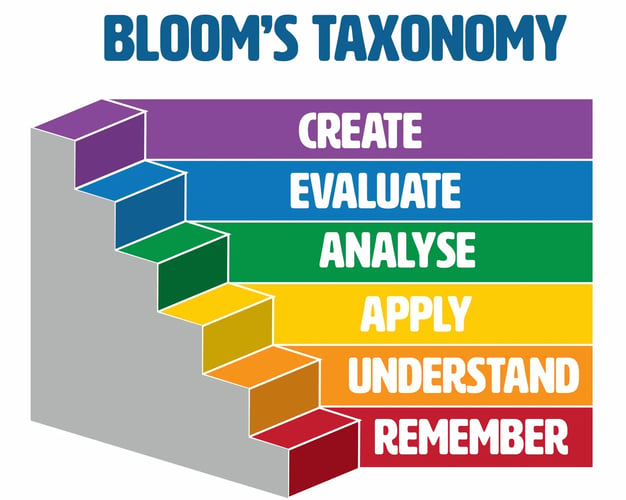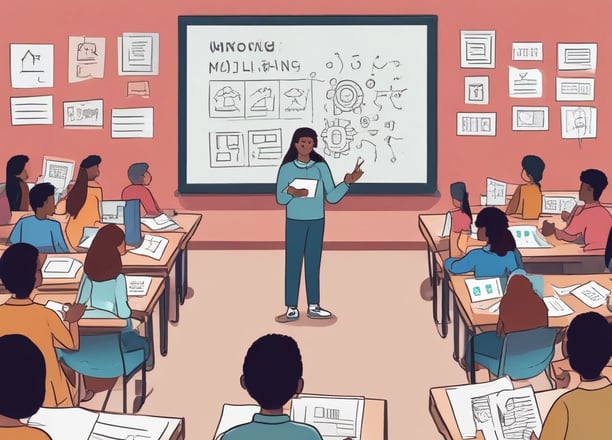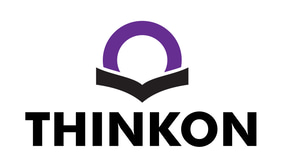Bloom’s Taxonomy
1. Knowledge (Remembering)
Help students recall basic facts, terms, and concepts.
ThinkON Learning follows Bloom's Taxonomy by progressively guiding students from basic knowledge to advanced critical thinking through interactive content, quizzes, and practical exercises. Beginning with simple recall activities like flashcards and quizzes, it then moves to comprehension with real-life examples and animations. Students apply concepts through simulations and problem-solving tasks, analyze data via case studies, and synthesize knowledge through creative projects like designing ecosystems. Finally, evaluation is encouraged through debates, peer reviews, and critical discussions. This structured approach ensures engaging, bite-sized learning that enhances retention, application, and mastery of concepts.
3. Application (Applying)
Encourage students to apply knowledge to real-life situations
5. Evaluation (Evaluating)
Help students critically assess and judge the validity and quality of ideas, arguments, or solutions.
2. Comprehension (Understanding)
Ensure students understand the material.
4. Analysis (Analyzing)
Help students break down complex information into parts and understand relationships.
6. Synthesis (Creating)
Encourage students to combine information in innovative ways to create new ideas or solutions.


Learning Approach
At ThinkON Learning, we employ a structured, student-centric approach that blends innovative materials with proven teaching methods to ensure effective learning at every step.
Gradual Mastery with Bite-sized Lessons


At ThinkON Learning, we understand that effective learning happens when students are engaged without feeling overwhelmed. That’s why we’ve designed our courses using the bite-sized learning approach.
Each module is broken down into manageable sections, each focusing on a single concept or skill. This ensures that students can focus on mastering one idea at a time before moving on to the next. The modules start with foundational concepts and gradually increase in complexity, providing a smooth progression that builds student confidence as they go.
By delivering content in small, digestible chunks, we make learning more engaging, less stressful, and easier to retain. This approach allows students to master concepts at their own pace while avoiding cognitive overload, ultimately leading to a deeper and more lasting understanding. Whether it's school exams, NEET, JEE, or Olympiad preparation, our bite-sized learning ensures that each student can progress steadily and confidently, without feeling rushed or overwhelmed.


At ThinkON Learning, we believe that learning becomes more meaningful when students can connect concepts to the world around them. That’s why we integrate real-life examples into every lesson, making complex topics easier to understand.
For instance, when teaching physics concepts like force and motion, we use everyday experiences such as the way a car accelerates or how objects fall. In biology, we explain cellular processes using examples from nature, like how plants absorb water through their roots or how animals adapt to their environments.
These relatable examples help students see the practical applications of what they're learning, improving their comprehension and retention. By bridging the gap between theory and real life, we make education more engaging and help students grasp even the most challenging concepts with ease.
Real-life Examples
Interactive Learning
At ThinkON Learning, we believe that active participation is key to mastering any concept. That's why we incorporate a variety of interactive elements to make learning more engaging, effective, and fun.


Tests
Our comprehensive tests simulate exam conditions and help you prepare for competitive exams like NEET, JEE, and Olympiads. These tests are designed to assess both conceptual understanding and application skills, ensuring you're fully prepared for any challenge.
Mind Maps
We use mind maps to visually organize complex concepts and relationships between topics. This approach simplifies the learning process by giving you a clear, structured view of how ideas connect, making it easier to retain information and see the bigger picture.
Quizzes
Regular quizzes are designed to test your understanding in real-time, reinforcing what you've learned and helping you identify areas that need more focus. They provide instant feedback, allowing you to gauge your progress and improve at your own pace.
Engaging videos and interactive simulations bring theoretical concepts to life. By using real-world examples and dynamic visuals, we help you visualize difficult concepts in subjects like physics, chemistry, and biology.

